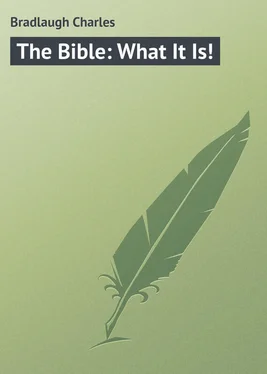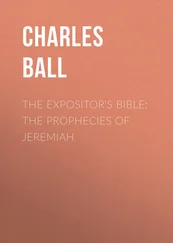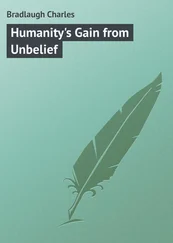Charles Bradlaugh - The Bible - What It Is!
Здесь есть возможность читать онлайн «Charles Bradlaugh - The Bible - What It Is!» — ознакомительный отрывок электронной книги совершенно бесплатно, а после прочтения отрывка купить полную версию. В некоторых случаях можно слушать аудио, скачать через торрент в формате fb2 и присутствует краткое содержание. Жанр: foreign_prose, на английском языке. Описание произведения, (предисловие) а так же отзывы посетителей доступны на портале библиотеки ЛибКат.
- Название:The Bible: What It Is!
- Автор:
- Жанр:
- Год:неизвестен
- ISBN:нет данных
- Рейтинг книги:5 / 5. Голосов: 1
-
Избранное:Добавить в избранное
- Отзывы:
-
Ваша оценка:
- 100
- 1
- 2
- 3
- 4
- 5
The Bible: What It Is!: краткое содержание, описание и аннотация
Предлагаем к чтению аннотацию, описание, краткое содержание или предисловие (зависит от того, что написал сам автор книги «The Bible: What It Is!»). Если вы не нашли необходимую информацию о книге — напишите в комментариях, мы постараемся отыскать её.
The Bible: What It Is! — читать онлайн ознакомительный отрывок
Ниже представлен текст книги, разбитый по страницам. Система сохранения места последней прочитанной страницы, позволяет с удобством читать онлайн бесплатно книгу «The Bible: What It Is!», без необходимости каждый раз заново искать на чём Вы остановились. Поставьте закладку, и сможете в любой момент перейти на страницу, на которой закончили чтение.
Интервал:
Закладка:
The third chapter of Genesis contains, according to its heading, an account of man's 'most shameful fall.' It will be in vain to attempt to treat the contents of this chapter as a relation of actual occurrences. The following is a summary: a serpent, walking erect on its tail instead of crawling on its belly, tempts Eve to eat the forbidden fruit, urging that Adam has been deceived by God; the woman (not at all surprised at being addressed by one 'in such a questionable shape') saw that the tree was good for food (how she saw this does not appear) and ate and gave to her husband. Upon eating, their eyes are opened, and they are ashamed of their nakedness, and sew fig leaves together to make breeches. This sewing was before the invention of needles. The species of this fruit has formed the subject of much conjecture; one kind only has since been known to confer on man and woman a knowledge of their nakedness after mutually partaking thereof, and it has therefore been suggested that this chapter is an allegorical representation of the union of the sexes. After eating, Adam and Eve hear the 'voice of the Lord God walking,' and they hide themselves. It is not easy to understand how either God or his voice could walk in the garden, nor why he should walk in the cool of the day, as we cannot suppose heat to affect him. The reason Adam gives for hiding himself is not a correct one; he was not naked unless his fig-leaf garment had fallen to pieces. God having ascertained that Adam had disobeyed his command, cursed the serpent and commanded it to eat dust and go upon its belly all the days of its life; God also cursed the ground. It does not appear, however, that he carried out the threat contained in chap, ii, v. 17; in fact, the serpent appears to have been more correct in saying to Adam and Eve, 'Ye shall not surely die.' Some divines would have us believe that by the sin of Adam death was introduced into the world, and the Rev. Dr. John Pye Smith tells us, 'It is probable, had not man fallen, that, after a continuance in the earthly state for a period of probation, each individual would have been translated to a higher condition of existence.' Unfortunately, this hypothesis will not bear investigation. Professor Newman says, in relation to this subject, 'A fresh strain fell on the Scriptural infallibility, in contemplating the origin of death. Geologists assured us that death went on in the animal creation many ages before the existence of man. The rocks formed of the shells of animals testify that death is a phenomenon thousands and thousands of years old; to refer the death of animals to the sin of Adam and Eve is evidently impossible. Yet, if not, the analogies of the human to the brute form make it scarcely credible that man's body can ever have been intended for immortality. Nay, when we consider the conditions of birth and growth to which it is subject, the wear and tear essential to life, the new generations intended to succeed and supplant the old – so soon as the question is proposed as one of physiology, the reply is inevitable that death is no accident, introduced by the perverse will of our first parents, nor any way connected with man's sinfulness, but is purely a result of the conditions of animal life. On the contrary, St. Paul rests most important conclusions on the fact, that one man, Adam, by personal death, brought death upon all his posterity. If this was a fundamental error, religious doctrine also is shaken.'
Verse 20. 'And Adam called his wife's name Eve, because she was the mother of all living.' This can hardly be the reason, as Eve was not the mother of anybody at that time. The word [ – ] (Adam) means red or ruby, and [ – ] (Eve) to show, discover, or declare.
Verse 21. I suppose the most enthusiastic advocate for the literal reading of the Bible would hardly wish us to picture God as a tailor. One of the Jewish Rabbis asserts that God clothed Adam and Eve with the skin of the serpent who had tempted them.
Verse 22. (And the Lord God said, Behold the man is become as one of us.' One of whom? To whom are these words addressed? It is evident that the writer of this book believed in a plurality of Gods, and had not any very elevated ideas in relation to those Gods, for, in the very same verse, he makes God express fear lest Adam should take or the tree of life, and eat and live for ever. Does it mean that man's soul was not then immortal? it cannot mean that man's body could become immortal. If man's soul was not then capable of living for ever, when did its nature become changed? Verse 24. 'Cherubim!' This word is ridiculous; cherubim is the plural of cherub; the is merely a specimen of Bible orthography. In Walker's Pronouncing Dictionary I find the following severe remark on the word 'Cherubim:' – Those who understand no language but their own are apt to commit an unpardonable fault with critics, by mistaking this word for a singular, and writing the plural "Cherubims."' It is evident, therefore, that if God inspired the Bible, he did not inspire the grammar. But what is a cherub? the word [ – ] (kereb) is of very doubtful meaning, and seems to have been used to express an inferior kind of deity. In the seventh edition of Parkhurst's Hebrew Lexicon, the correspondence between the description of the cherubim in Ezekiel and the inferior deities in other mythologies is fully and ably pointed out under this head. Were it not for the length of Parkhurst's article, I would quote the whole, it constituting an elaborate essay in which the astronomical origin of every religious system is clearly proved. An interesting astronomical explanation of the allegory or the fall is given in pp. 294-5 of 'Volney's Ruins.' Some of the cherubic figures are a compound of ox, eagle, lion, and man. Are we to imagine several of these with a flaming sword, guarding the way to the tree of life?
Having read the third chapter carefully, we are irresistibly driven to the conclusion that Adam's primitive nature was extremely frail, for he fell with the first temptation, and no greater evidence of frailty can be given; yet Adam is the choice work of God, made in his own image.
Chapteriv contains the history of Cain and Abel, which presents several remarkable features for our consideration. Cain and Abel both make sacrifices to the Lord. Why they should so sacrifice does not appear; they do not seem to have followed the example of Adam, as we cannot find any history of his sacrificing to the Lord at all. By verses 4 and 5 we find that the Lord had respect unto Abel and his offering, but unto Cain and his offerings he had not respect. Why is this? Cain's offerings consist of flowers and fruits, sending up sweet fragrance to heaven; Abel's offerings are the bleeding carcasses of slaughtered lambs; yet God, 'with whom there is no respect of persons' (2 Chronicles, chap, xix, v. 7 – Romans, chap, ii, v. 11), respects Abel more than Cain. How was this respect shown? God, by showing favour to Abel without assigning the least reason for the
Preference, created animosity between the two brothers. God must have foreknown that this religious strife would end in bloodshed. Religious strife always has led to war, and it is only because people are growing larger than their creeds that they now do not fight quite so recklessly about them.
Verse 7. It is somewhat perplexing to find that, although God is displeased with Cain, yet he tells him he shall rule over his brother Abel.
Verse 13. This verse is translated in a very different manner to the Douay. In our version Cain complains of the severity of his punishment; in the other, Cain says that his sin is too great for pardon. Which is right? Verse 14. What does Cain mean when he says 'Every one that findeth me shall slay me.' 'Every one 'can only be used when there is a likelihood of meeting with many persons, yet Cain must have been well aware that no persons were then in existence beside his father and mother.
Читать дальшеИнтервал:
Закладка:
Похожие книги на «The Bible: What It Is!»
Представляем Вашему вниманию похожие книги на «The Bible: What It Is!» списком для выбора. Мы отобрали схожую по названию и смыслу литературу в надежде предоставить читателям больше вариантов отыскать новые, интересные, ещё непрочитанные произведения.
Обсуждение, отзывы о книге «The Bible: What It Is!» и просто собственные мнения читателей. Оставьте ваши комментарии, напишите, что Вы думаете о произведении, его смысле или главных героях. Укажите что конкретно понравилось, а что нет, и почему Вы так считаете.












